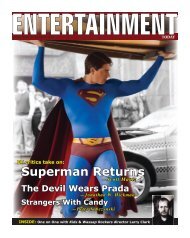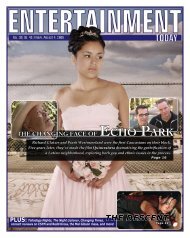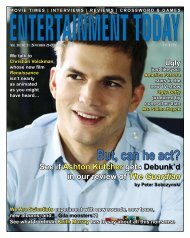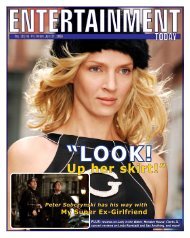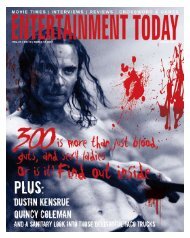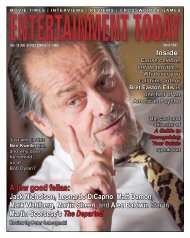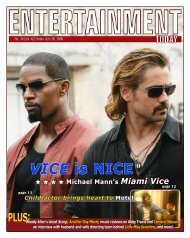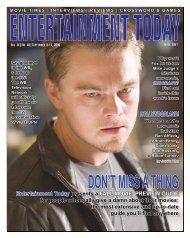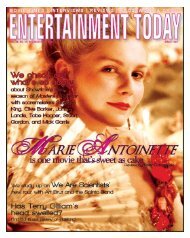LOVE
this issue of Entertainment Today
this issue of Entertainment Today
You also want an ePaper? Increase the reach of your titles
YUMPU automatically turns print PDFs into web optimized ePapers that Google loves.
A medieval knight duels a personification of death at a game of chess in this poetic film.<br />
by Aaron Sheley<br />
In the Middle Ages, as a knight<br />
returns from the Crusades, he is let<br />
down by the omnipresent absence<br />
of God.<br />
As the knight begins a metaphysical<br />
chess game with Death (of<br />
which there are endless parodies)<br />
the story shifts to two actors—Jof<br />
and Mia—who contrast the knight<br />
by seeing the glorious visions of<br />
God all around them. Still, Death<br />
tolls for all the characters involved,<br />
and at the film’s grim conclusion, Jof<br />
has a vision of the Reaper dancing<br />
away with his victims. At a turning<br />
point in the film, Max von Sydow’s<br />
crusading knight looks at a woman<br />
straight in the eyes as she burns at<br />
the stake. He<br />
needs to know<br />
if she really<br />
has seen the<br />
Devil. All he<br />
sees is terror<br />
in her eyes.<br />
G o d i s<br />
nowhere,<br />
and the Dark<br />
Ages are overrun<br />
with self-flagellators and plague<br />
victims, all very offensive to the<br />
knight’s squire who is jaded from<br />
his experiences in battle. In fact, he<br />
wants nothing except for the knight<br />
to give up his futile longings.<br />
Director Ingmar Bergman, master filmmaker.<br />
his one-on-one with Death at the<br />
chessboard, nothing confirms for<br />
the knight that God is real.<br />
Instead, Bergman’s allegorical<br />
iconography reflects the contemporary<br />
themes of struggle in a<br />
world without redemption. The<br />
knight cheats Death by knocking<br />
game pieces over to save the life<br />
of Jof and Mia. He finds his only<br />
moment of peace when he stops to<br />
eat strawberries with the performers.<br />
Thus, he rescues them.<br />
However, there is still never an<br />
actual sign that he will see God in<br />
this life or the next. In fact, the<br />
closer he gets to his own certain<br />
demise, the further he becomes<br />
obfuscated from the presence of<br />
holiness.<br />
The death<br />
that awaits<br />
the knight is<br />
purely symbolic<br />
oblivion<br />
for the quest<br />
for God and<br />
Truth in our<br />
universe.<br />
Viewers will<br />
be amazed at the production design<br />
that is an uncanny reflection of the<br />
Middle Ages. Settings include<br />
taverns, a blacksmith’s quarters, village<br />
squares, and a dark castle that<br />
provoke a metaphoric world twice<br />
removed by time and space.<br />
A sunny Friday afternoon in<br />
Beverly Hills, and the streets are<br />
already congested.<br />
Tourists don fanny packs and<br />
backpacks, and grip small digital cameras.<br />
They snap photos beneath the<br />
Rodeo Street sign. They pass in and<br />
out of designer name stores like they<br />
were participating in animal exhibits<br />
at a zoo. They mix with the nine-tofivers,<br />
rich housewives, and local kids<br />
who sip down iced mochas during the<br />
final weeks before school.<br />
The intersection of Rodeo Drive<br />
and Wilshire Blvd is the site of the<br />
famed Regent Beverly Wilshire, the<br />
hotel once called home by the likes<br />
of Elvis, Lennon, and Warren Beatty.<br />
The presidential suite was even featured<br />
in the film Pretty Woman, but<br />
today it’s the sight for a press junket<br />
organized by Focus Features for<br />
Hollywoodland.<br />
Upstairs in Suite 815, members of<br />
the online and print press—many of<br />
whom moonlight in other professions<br />
(today the majority are realtors)—help<br />
themselves to multiple portions of the<br />
generous lunch spread.<br />
Hollywoodland examines the<br />
The stark, existential poetry of<br />
circumstances that surrounded the<br />
the Seal is heightened by Bergman’s Seal stands the test of time as 1959 suicide of George Reeves, the<br />
own soul-searching for the Faith being one of the greatest philosophical<br />
actor who played Superman on the<br />
he long before lost. While Jof<br />
journeys into apocalyptic popular television series Adventures<br />
receives the peaceful visions of agnosticism that has ever appeared of Superman. The film follows dual<br />
God, the knight views only ruin, on the art film circuit. P narratives, tracks the years leading<br />
heartache, and suffering. In spite of<br />
up to and through Reeves’ tenure on<br />
the show, and all the while follows<br />
the fictionalized character of private<br />
dick Louis Simo who takes on the<br />
case only to find striking parallels<br />
between Reeves’ life and his own in<br />
ENTERTAINMENT TODAY<br />
his attempt to uncover clues of foul<br />
play in the “Man of Steel’s” death.<br />
Dressed causally and fresh from<br />
the makeup chair, the major actors<br />
from the film—Ben Affleck, Adrien<br />
Brody, Diane Lane, Bob Hoskins, and<br />
ENTERTAINMENT TODAY SEPTEMBER 15-21, 2006 |18|<br />
Allen Coulter (center) directs the cast of Hollywoodland, an enigmatic murder-mystery set during the Golden Era of Hollywood.<br />
by Jesse Alba<br />
Robin Tunney walk into the room<br />
accompanied by the film’s director,<br />
Allen Coulter. The Q&A session<br />
begins politely with the biggest star<br />
in the room, Mr. Affleck (who plays<br />
Reeves).<br />
You took a break from filmmaking,<br />
why was that?<br />
BEN AFFLECK: I made a decision<br />
to do things I wanted to do. Not for<br />
money or fame. It’s great to step<br />
away for a little while.<br />
What was it that attracted you to<br />
this story?<br />
DIANE LANE: I always had a thing<br />
for George; he had me hook, line, and<br />
sinker. There were so many layers<br />
to his story, and I was happy to play<br />
a source of love in his life. I felt a<br />
burden of responsibility to honor her<br />
(Toni Mannix) as closely as she’s<br />
been described: her vulnerability and<br />
how that came out all wrong. It’s<br />
interesting to be a thread in such an<br />
interesting tapestry.<br />
Can you talk about the theme of<br />
life in Hollywood not going as<br />
planned?<br />
AFFLECK: I know a thing or two<br />
about that (laughter). There’s the<br />
sense that what George had should’ve<br />
been enough. He had the condition<br />
where it’s never enough. The same<br />
impulse that propels us to greatness is<br />
also the source that keeps us perpetually<br />
unsatisfied.<br />
ADRIEN BRODY: The advantage<br />
of this piece is that it illustrates [this<br />
dilemma] is not something exclusive<br />
to the film industry: the notion that<br />
if people had more of something,<br />
it would fulfill them. Having lived<br />
as a struggling actor and having<br />
achieved a certain level of fame, I’ve<br />
encountered the advantages and the<br />
pitfalls. I struggle less with things<br />
that I thought would make me happy.<br />
My character Louis Simo looked for<br />
a bigger picture rather than solving<br />
the smaller problems that could have<br />
improved his life.<br />
What was it like stepping into another<br />
era?<br />
LANE: It’s always fun to step into<br />
another time. There’s always something<br />
to explore, the limitations and<br />
freedoms of that time.<br />
ALLEN COULTER: We tried to<br />
take an approach that would lend<br />
some originality to that period. We<br />
tried to make 1959 the modern world<br />
that was the beginning of the world<br />
we know now. Visually, we gave a<br />
look that emphasized its modernity.<br />
We went back for Reeves’ period.<br />
The modern era had a ubiquity of<br />
noise: records playing, dogs barking,<br />
etc…<br />
The film deals with an era in<br />
which the public was primarily<br />
concerned with the characters being<br />
portrayed rather than the actors<br />
behind those roles. Today’s audiences<br />
seem as interested, if not<br />
more so, in the personal lives of the<br />
actors. Has this made your jobs<br />
more difficult?<br />
BRODY: That differs for the individual.<br />
Those are separate questions.<br />
Some people are fascinated<br />
by the transformation. That’s what<br />
my motivation has been. I love the<br />
opportunity to be here and discuss<br />
my work and hear thoughts that have<br />
been overlooked. The process and the<br />
rest of it comes with it, and just is.<br />
AFFLECK: People think they know<br />
me. They think I know them.<br />
BOB HOSKINS: I’ve never had that<br />
problem because most people don’t<br />
know who I am.<br />
AFFLECK: No one wants to see the<br />
sausage being made, they just want<br />
to eat it. P



